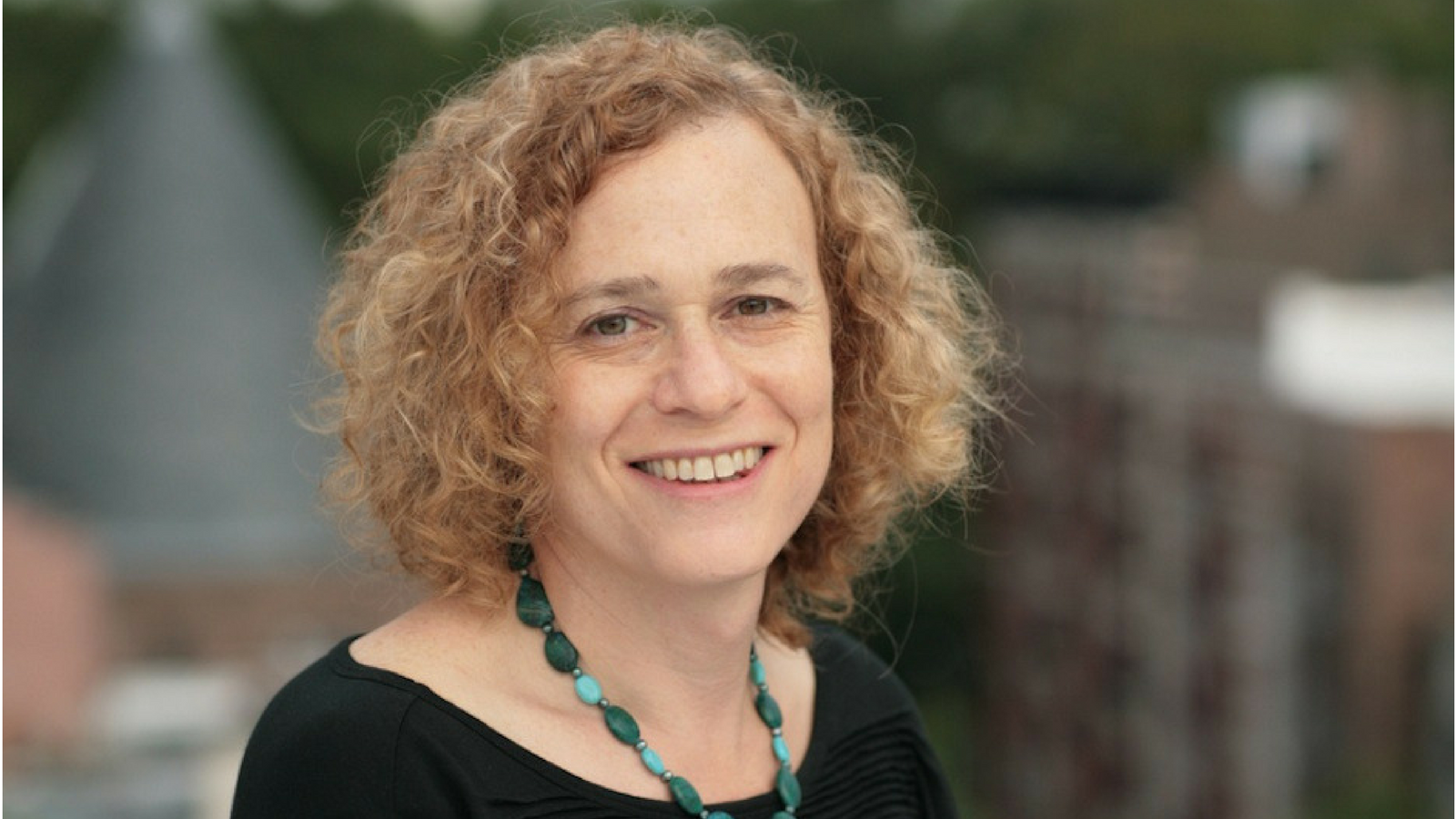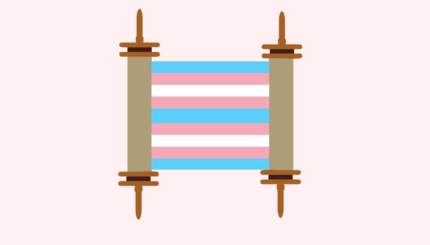Keshet Board Member Joy Ladin chose to embark on a journey of respectful conversations about transgender identity, religion and tradition in culturally conservative communities. As the first openly transgender employee of an Orthodox Jewish institution, her goal was to engage with people who had little or no relationship with people who are transgender.
What inspired you to begin this project?
After the election, I felt like, wow, my country includes a lot of people who see the world so differently than I do. I totally don’t understand the decision they just made on any level, and yet we’re part of the same country. I live in a blue, Jewish bubble and I wanted to understand more ways of looking at the world than my little bubble affords me.
I also had a sense that there were people who voted for Trump out of a feeling of being neglected and actively disrespected, particularly by people like me: East Coast academics who advocate for LGBT rights. Conflict-based advocacy can turn profoundly disrespectful. It can be effective, and it can be necessary, but it comes at a high cost. I didn’t want to do that. What I wanted to do was go into places where individuals were feeling misunderstood and disrespected by people like me, and not have any agenda beyond, “I’m here, and I’m offering understanding and respect.”
I would do it on their terms. I would abide by whatever bathroom they wanted me to use. I’m a guest in their house, and I’m not telling them that they have to change anything. My primary goal would be that they would feel listened to and respected by a kind of person that they didn’t feel was listening to or respecting them. I believe that doors are opened when people feel heard. But you can’t open them by force. You don’t have any control over whether that happens or not. My thinking was, “I’m going to go, and I’m going to try to get this process going and if people want to ask questions or engage in dialogue, or if they want to engage with me in some other way, that’s fine.” My bottom line goal, though, was that I want to go there and make sure that people know that they’ve been listened to with respect and hopefully that they feel understood…that that would be a tikkun olam.
How did you pick which communities to go to?
It would have been nice if I had been able to do that. I still think my plan sounds good, but it hinges on something that I haven’t been able to make happen yet. Although I’ve been able to do talks in red areas of the country, they aren’t out of my bubble in the way that I wanted them to be. The post-election maps show this undifferentiated sea of red, and I assumed that if I could get into those neighborhoods, I would be talking to conservative people. My first talk was in rural Wisconsin. I have a friend who retired there, and it is a very pro-Trump area. But when she was trying to set up my talk, she found herself working with an interfaith group made up of all of the most liberal clergy in the area who all already supported LGBTQ rights. My friend was afraid she was the only one. That’s something I’ve heard a lot—that the people in conservative areas who didn’t vote for Trump are afraid, and feel as if there is a huge cultural divide within their communities. My talk was in a nice little town and I was told that one town over there’s a community of the same few families who had been there for generations, and they are very, very conservative. Even though they were a few miles away, nobody from that town came to my talk.
On the other hand, the progressive-leaning people who came to my talk were still eager to talk through issues surrounding trans identity. Although there’s consensus in some communities that we shouldn’t be mean to trans people and that we should change some policies, in most, there hasn’t been a lot of wrestling with basic questions, such as, “If we accept self-determined trans identities, what does that mean we believe about gender?” and “If we’re a community that supports trans people, how do we acknowledge and include people who don’t accept the idea of gender on which trans identities are based? Wherever I go, I try to encourage those kinds of conversations, and give people a way to have them without feeling stigmatized.
In Birmingham, everybody who came was either LGBT or an ally, or they were part of a support network. They were a community because they were embattled, and they were taking great risks. There were doctors who started the first support group for gender-variant teens in the area, and there were teens who had taken the risk of coming out at school. There was a family that seemed like an embodiment of upper middle class white privilege. They were Christian, and the father was a surgeon, I think. One of their children came out as trans. They were there because they had decided to support their child, even though they had no idea what being trans meant, or what the social risks would be. They ended up with their whole lives and social networks turned upside down. I learned a great deal, and I was just scratching the surface of the variety of different ways that people live in America.
I didn’t do what I had naively envisioned myself as doing, though. I had imagined myself visiting an evangelical church who had invited me even though their concept of gender was based on fundamentalist readings of genesis. I would go there and I would do my listening and understanding and respecting thing, and I would see what happened. Even though I have never done that before, I believe–and still believe–my vulnerability could help open the possibilities of connection and dialogue. I haven’t had the opportunity yet. It’s possible that I will never get this kind of a gig, because the only ministers who have considered inviting me to churches like that are about to be kicked out of their congregations. But I’m still hopeful. I’m hoping to go back to Alabama and build on the connections that I made there, though my wife made me promise not to do any more visits there until next year.
What was her reaction when you told her you were going to do these trips?
She was afraid. She assumed that I’d be a lot more successful in getting out of my bubble than I have been. I, myself, don’t feel so afraid.
Why is that?
Partly, I think it’s naiveté and stupidity–I’m really not aware of how many kinds of people there are and the strength of feelings they can have. It’s also because I won’t go anywhere that I’m not invited. I’m not showing up in a rural community and saying, “I’m here, I’m queer. Let’s talk about gender.” I’m neither that brave nor that foolish. But courage aside, I don’t feel like that’s the basis for the kind of conversations that I’m hoping to have happen–ones where people on both sides are vulnerable but don’t feel like they’re under attack. I like people, and I love the process of learning and trying to understand them. I don’t usually feel threatened when I’m in those kinds of roles. Irrationally, I feel protected by my desire to be with people and understand them.
Most of the people that I talked with down south did not identify as LGBTQ. But they wanted to do the right thing, to respect and include LGBTQ people, and wanted to learn how to do that. The language people use is sometimes rough and the questions are sometimes personally challenging. I think the one that shook me up the most was someone who had read my book who asked, “Don’t you think that it was wrong for you to get married and have children, knowing you were trans?” (This wasn’t down south; it was in the Boston area. Trans people don’t have to go far to get out of progressive bubbles.) I was taken aback by that, but I felt that it was a serious question, and not one that I’d thought about. My life is often changed by the questions I get. I reexamine my life and my ways of thinking in light of them. That question made me wonder, “Was this morally wrong? Should I have made another decision?” The answer was clear to me, and I said to her, “I’m pretty sure my children would prefer to exist.” But saying that out loud changed me, because when I did so, I was affirming the value of my existence even for my children who have gone through so much as a result of my gender transition. They didn’t need me to be trans. Yet even though I am trans, they needed me…not someone else, but me, to be their parent.
Another person asked me, “Did you know you were a woman in a man’s body even when you were a child?” I thought, what a crazy question. But then I realized that when I was a child, that was the language I used to try to understand my trans identity. I remembered how crazy it made me because that language makes no sense at all. That question sparked a whole chain of reflections and writings about language for trans identity and how it does and doesn’t work. So even when questions from outside my realm of assumptions are hard to hear and answer, they are gifts.
Of course, teaching at Yeshiva University, I do spend a significant part of my life in what you might call a red area. The University and students are overwhelmingly supportive of Republicans, and many–though not all–students voted for Trump. Last year, after the election, there was a tiny group of students who are Democrats who reached out to me after Ben Shapiro, the former Breitbart writer, spoke at length at the University insisting that trans identities are delusional. Shapiro spoke to 700 people, and was cheered throughout his talk. The brave group of student Democrats wanted to have me do a talk in response. One of the benefits of the election results is that it made people feel like they needed to choose sides. There were students who came forward and wanted to show that they were supportive. The administration wouldn’t let them have the talk in a big hall, or publicize it clearly, so we met in a classroom that was full to overflowing. Many of my students were there, but I didn’t know most of the people. Some of them were very, very conservative and made that clear from their questions. The conversation we had was similar to what I’m trying to do with this project.
Do you have any particular examples of meaningful connections from this project?
There was a woman in rural Tennessee who was deeply, mystically Christian. She told me she had had visions of the Virgin Mary from the time she was a young child, and it helped her survive being abused by one of her parents. She was very close to her child who came out as trans as a young adult. She really didn’t know what to do when he came out. She loved him, and never considered cutting him off. But she didn’t know anything about trans issues, and she had no idea how to find support for her child or for herself. A lot of parents, when their children come out to them, worry: “Will you be attacked? Will you be able to find a job? Will you be able to find love?” She had all of these anxieties, and the desire to stay close to her child. When she was talking to me, she told me all of the mistakes she felt she had made. “When I look back on his childhood, I didn’t know that that’s why he was so unhappy.” She felt filled with guilt because she had just wanted to be the best possible parent, and she knew that she had fallen short.
I didn’t have parents like her–parents who would change their lives for their child’s sake. She was the first person that I had talked with intimately who had these struggles. I was the first person that she could talk to who was both a trans person and a parent. I told her that she had clearly loved her child throughout their lives, and how much it meant to me to see that love and dedication. I could glimpse for a minute a level of religious insight I don’t usually have–that there’s a kind of love that triumphs over all of the messiness of our relationships with people. It’s a love that is expressed through our commitment to loving others, whoever they are, however they change. Ultimately, that’s what matters.
You can help fund Joy’s project here.



